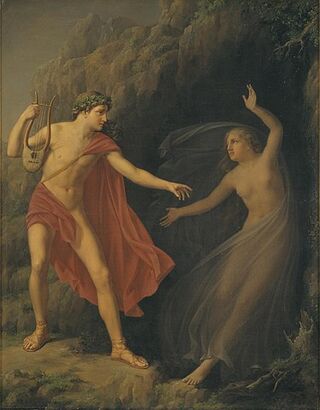Trust
Using Music to Inspire a New Start After the Pandemic
Chasing cars with Cerberus.
Posted March 28, 2022 Reviewed by Lybi Ma
Key points
- Music may have properties found in certain psychotherapy models.
- Jungian analysis of myths offers insights into human universal experiences such as trauma and loss.
- Some modern songs may have lyrical elements related to Jungian Archetypes.
- The myth of Orpheus and Eurydice can be a lens through which to view our challenges during the Covid pandemic.
After over two years of enduring Covid lockdowns, many of us have had moments of wondering whether life as we knew it, or the world as we knew it, was “over.”
Some of us have struggled to maintain meaningful connections with those we love and are attached to over the miles. Many spent our time alone, reconnecting with ourselves inside our heads, pondering what we might salvage for the future.
We learned to bake for the first time. We took up new self-care activities that need only the minimum: a room, a floor, and our own body, such as the practice of yoga.
Many of us even found a new appreciation of music to keep us company in our aloneness.
Healing Music
According to the research of Varvara Pasiali (2013), our intimate attachments to others are affected by music in terms of emotional regulation, communication, and the capacity to form and rebuild relationships.

My first foray into the unmasked, post-Covid world was to a Snow Patrol concert, where they played Chasing Cars, awarded “the most-played song of the 21st century.” Musician Ed Sheeran calls it one of the top 20 most beautiful songs ever written.
I was surprised to be overcome with emotion as a listener, and after reflection, was for some reason reminded of the Greek myth of Orpheus and Eurydice. The feeling lingered with me long after the show.
“If I lay here… Would you lie with me and just forget the world.”
These lyrics are reminiscent of the mindfulness of yoga, the final pose of which is Savasana—where one lays in “corpse pose.” Laying down is symbolic of death, letting go of “our former self” to emerge born as our “new self.” The research literature even identifies Savasana as superior in stress reduction to sitting in a chair or normal supine position. (Bera, 1998).
The position is used for visual effect in the band’s official song video on YouTube.
The Underworld of the Unconscious
Orpheus was one of the very few mortals in the Greek canon ever allowed by the gods to descend into the world of death but to return to the world of the living. His music was so beautiful that it charmed the guardian of the Underworld, the three-headed dog, Cerberus, and even Hades himself.
Orpheus was pursuing the love of his life—Eurydice, who was bitten by a snake and died—and was permitted to rescue her and return her to life in the surface world. Only one rule was to be obeyed: Orpheus must not look back in doubt whether she was still following behind him.

As the tale goes, he looked back toward her near the surface in a lapse of confidence, at which she was returned to the Underworld and death. Orpheus was eventually torn to shreds himself, with only his head preserved to go on singing his beautiful music for all future generations.
Those who remember a lingering Orphean beauty after the tragic ends of Kurt Cobain, Chris Cornell, and so many other musicians to die young may still benefit from their gifts.
One could interpret the myth as imploring us to trust ourselves to let go of lost loves but to trust new experiences yet to come in life. It could instruct us to trust our inspirations about what next steps to take in life in general.
Those of us blessed to have a family, children, a partner, or a friend with which to quarantine may have given us the space to discover these Orphean lessons. Consider it a Savasana of everyday living that grants us a new direction in life after a clarifying, playful pause in “chasing cars around our heads” together.
Existential Therapists have a term for this attentive, engaged experience called “lived time.” Making life richer, of more “quality time,” and intimately connected to those we love through the cultivation of living in the present moment. To take our dreams of a happy future seriously enough to let them breathe in the here and now.
The Rule of Orpheus: "Don't Look Back"
The lyricist and singer, Gary Lightbody, offers us a musical approximation of Existential Therapy for our former, stressed-out selves. After the death, loss, breakups, and heartbreaks that are inevitable during a global catastrophe, the song asks us to “just lay here” and “forget the world.”
Down we go into the Underworld of the imagination and our attachments, lulling even the fearsome, three-headed dog and guardian of that forbidden place, Cerberus, into “chasing cars” with us.
Orpheus cannot exist without a Eurydice. A peek at the Quora postings regarding listeners’ interpretation of Chasing Cars reveals that the top three most popularly appreciated answers were from women still grieving the loss of a well-loved brother, husband, or even a young son to war, disease, or despair. Eurydices left behind and grieving their loss of the male most dear to them.
The researcher, Terence Dawson (2000), posits the existence of an “Orpheus Complex,” where the traumatic loss of attachment to a loved one follows a repeatable universal pattern. He suggests this tragic character arc can be transcended and resolved by both men and women.
Maybe it was the bliss of being set free of Covid, if even for one night, but this song may be revered in no small part for its lieto fine alternative to the tragic end met by Orpheus. The myth is a warning about obsessing on lost attachments, but Dawson’s research suggests that we can learn to let go and, in so doing, turn the tragedy in life, to hope.
Orpheus and Eurydice has been inspiring musicians, writers, and artists throughout history. Still, its lessons apply to us all because we all have an unconscious from which to pull inspiration and where, in our solitary contemplation, we are to not look back—that if we want to love, we need to trust without reservation. If we are to dream of a future, we need to trust our first intuitive steps toward it, despite our experiences of the losses, death, broken ties, and loneliness that are part of being human.
References
Varvara Pasiali (2013). ”Music therapy and attachment relationships across the life span”. Nordic Journal of Music Therapy. Vol 23, Pages 202-223.
TK Bera, MM Gore, JP Oak (1998). “Recovery from stress in two different postures and in Shavasana—a yogic relaxation posture.” Indian J Physiol Pharmacol. 1998 Oct;42(4):473-8.
Westlake, Gregory M. (2001). "The Soul of Existential Therapy: Dialogues with Professors Todd DuBose and Miles Groth." Existential Analysis, vol. 32, no. 1, pp. 159+
Terence Dawson (2000). “The Orpheus Complex”. Journal of Analytical Psychology, 2000, 45, 245–266




